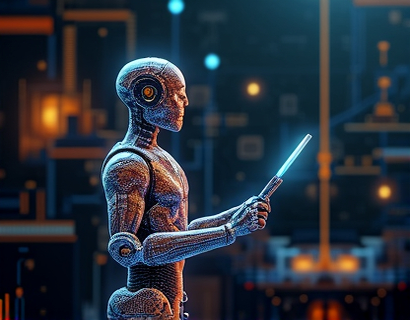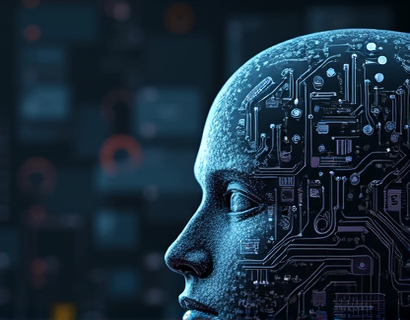Empowering Web3: Leveraging DAOs for Community-Driven Protocol Governance
The advent of Web3 has ushered in a new era of decentralization, where the power to govern and manage digital protocols is being shifted from centralized entities to decentralized autonomous organizations (DAOs). This shift represents a fundamental transformation in how communities interact with technology, emphasizing empowerment, transparency, and scalability. DAOs are not just a novel concept but a pivotal tool in realizing the full potential of Web3, enabling a more interconnected and equitable digital future.
Understanding DAOs in Web3
Decentralized Autonomous Organizations, or DAOs, are organizations governed by rules encoded on a blockchain. These rules dictate how the DAO operates, including decision-making processes, fund allocation, and member participation. In the context of Web3, DAOs play a crucial role in managing decentralized protocols, which are the backbone of the blockchain ecosystem. These protocols include decentralized finance (DeFi) platforms, non-fungible token (NFT) marketplaces, and decentralized social networks, among others.
The core principle of a DAO is decentralized governance, where decisions are made collectively by token holders rather than a central authority. This model aligns perfectly with the ethos of Web3, which seeks to create a more democratic and user-centric internet. By leveraging DAOs, Web3 protocols can benefit from community-driven governance, ensuring that the development and management of these protocols reflect the needs and desires of their users.
Community Empowerment Through DAOs
One of the most significant advantages of DAOs in Web3 is the empowerment of communities. Traditional centralized systems often leave users with little to no say in how the services they use are developed and managed. In contrast, DAOs give token holders a direct stake in the governance of protocols, allowing them to propose, vote on, and implement changes. This level of involvement fosters a sense of ownership and responsibility among community members, encouraging active participation and innovation.
For instance, in a DeFi DAO, token holders can decide on interest rates, fee structures, and new feature implementations. This direct involvement ensures that the protocol evolves in a way that benefits its users, rather than serving the interests of a few centralized entities. The transparency of DAO operations, with all proposals and votes recorded on the blockchain, further enhances trust and accountability within the community.
Transparency in Protocol Governance
Transparency is a cornerstone of DAO governance in Web3. All decisions, from minor updates to major overhauls, are documented on the blockchain, making them accessible to anyone. This level of transparency is unparalleled in traditional governance models, where decision-making processes are often opaque and subject to manipulation. The immutable nature of blockchain ensures that once a decision is made, it cannot be altered, providing a clear and verifiable history of the DAO's actions.
This transparency extends to financial operations as well. DAOs can use smart contracts to manage funds, automatically executing transactions based on predefined rules. This reduces the risk of fraud and mismanagement, as all financial activities are publicly visible and auditable. For users, this means greater confidence in the protocols they interact with, knowing that their contributions are being used as intended.
Scalability and Efficiency
Scalability is a critical challenge in the Web3 space, as the growth of decentralized protocols requires efficient and robust governance mechanisms. DAOs address this challenge by automating many governance processes through smart contracts. These contracts can handle routine tasks such as voting, fund distribution, and rule enforcement, freeing up community members to focus on strategic decision-making.
Moreover, DAOs can scale more effectively than centralized organizations. As the community grows, the DAO's governance structure remains decentralized and inclusive, accommodating new members and ideas. This scalability is essential for the long-term success of Web3 protocols, which need to adapt to a rapidly evolving technological landscape.
Case Studies: Successful DAO Implementations
Several projects have successfully implemented DAOs to govern their protocols, demonstrating the practical benefits of this approach. One notable example is the MakerDAO, which manages the stablecoin DAI on the Ethereum blockchain. MakerDAO's DAO allows token holders to propose and vote on changes to the protocol, ensuring that the system remains stable and responsive to market conditions. This community-driven approach has been crucial in maintaining the value and reliability of DAI.
Another example is the Aragon platform, which provides a suite of tools for building and managing DAOs. Aragon itself is governed by its DAO, where token holders decide on platform development, governance changes, and community initiatives. This self-governance model has enabled Aragon to become a leading platform for decentralized organizations, showcasing the potential of DAOs in fostering innovation and collaboration.
Challenges and Considerations
While DAOs offer numerous advantages, they also come with challenges that need to be addressed. One significant issue is the technical complexity involved in setting up and managing a DAO. Not all communities have the expertise to create and maintain smart contracts, which can be a barrier to entry. However, platforms like Aragon and others are working to simplify this process, making DAOs more accessible to a broader audience.
Another challenge is the potential for governance attacks, where malicious actors attempt to manipulate the DAO's decision-making processes. This risk can be mitigated through robust security measures and community vigilance. Additionally, ensuring high participation rates in voting is crucial for the legitimacy and effectiveness of DAO decisions. Strategies such as staking rewards and community engagement initiatives can help boost participation.
The Future of DAOs in Web3
As Web3 continues to evolve, the role of DAOs in protocol governance is likely to become even more prominent. The combination of blockchain technology, decentralized governance, and community empowerment offers a powerful framework for building sustainable and user-centric digital ecosystems. DAOs have the potential to revolutionize not only how protocols are managed but also how value is created and distributed in the digital world.
Looking ahead, we can expect to see more innovative applications of DAOs across various sectors, from gaming and entertainment to healthcare and education. The principles of transparency, community involvement, and scalability will continue to drive the adoption and success of DAOs, shaping a more interconnected and equitable digital future. As more individuals and organizations recognize the benefits of DAOs, the Web3 landscape will become increasingly dynamic and resilient.










































